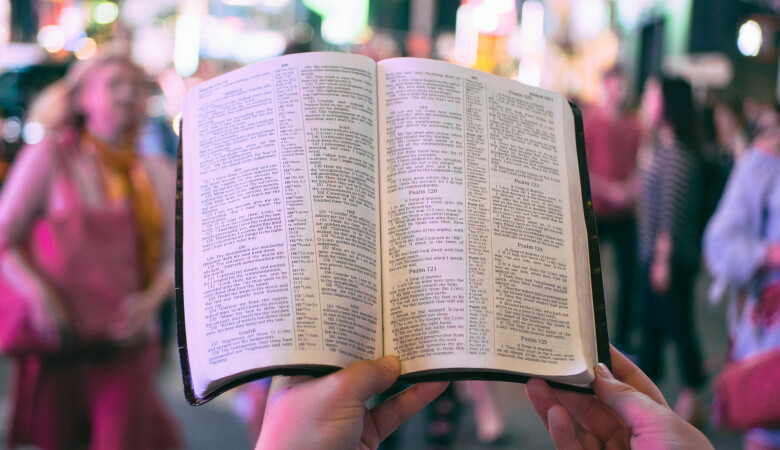The Life of Elijah - Week 11
September 08, 2002 | Andy Davis
1 Kings 21:16-29
Judgment
Pastor Andy Davis preaches an expository sermon on 1 Kings 21:16-29. The main subject of the sermon is God's promise to give the blaspheming Syrians into the hands of Israel.
- SERMON TRANSCRIPT -
We're looking tonight at first Kings chapter 21, verses 16 through 29, the end of the chapter. And as I mentioned in my prayer, we'll be considering the demise, the end of evil king Ahab. One of the most perplexing problems that Christians face in this world is the problem of wickedness and evil and specifically the problem of God's patience in dealing with them. It's a problem for us and it was a problem for people in olden times as well. For example, in Psalm 73, the Psalm must begin, "Surely God is good to Israel to those who are pure in heart. But as for me, my feet had almost slipped. I nearly lost my foothold for I envied the arrogant when I saw the prosperity of the wicked." This was a problem for the psalmist. It was difficult for him because as he looked out over the world, it seemed that the wicked were doing well. And he said, "I almost slipped." Well, what's the use? What's the use in keeping my hands clean? What's the use in being faithful to God if it seems that they always get ahead? And nothing ever seems to happen? We keep waiting for the other shoe to drop. We have the Word of God and the promise that the wicked will be judged, but it never seems to come. They only ever seem to prosper and do better and better.
I've told the story before of an atheist that used to go around in Scotland and tempt the Lord. He had all this presentation for how they could not be a God and at the end he would take his watch and he would dangle it over like this and give the Lord Almighty five minutes to strike him dead for all of his blasphemies. And you can imagine the drama of waiting silently as those five minutes tick by. Now, I wouldn't want to stand anywhere near him because you're never quite sure when it's going to come. But at any rate, he gave him five minutes. And then one speaker in particular got up, very memorable, an older man, a godly pastor, and he said, "Did my esteem colleague think that the grace and mercy and patience of the Lord could be extinguished in a mere five minutes?"
But the day does come, doesn't it? The day comes, and the Psalmist in Psalm 73 in the end said, "You know what helped me was when I went to the temple and then I understood their end. I knew what would happen in the end. Surely you place them," he says, "on slippery ground, you cast them down to ruin. How suddenly are they destroyed, completely swept away by terrors. As a dream when one awakes. So when you arise, oh Lord, you will despise them as fantasies." You see, when the day comes, it's finished, it's over and the wrath of the Lord comes. Now, I'm not doing Psalm 73 here, but I can't leave without saying some of the most glorious verses there are in all the scripture. This is how the psalmist in the end came to a sense of peace in the sovereignty of God. He said, "When my heart was grieved and my spirit embittered, I was senseless and ignorant. I was like a brute beast before you." Have you ever felt like that, acting like a beast in front of God? But that's what the psalmist felt. "I was like a beast in front of you, yet I am always with you. You hold me by your right hand. You guide me with your counsel, and afterward you will take me into glory. Whom have I in heaven but you? And earth has nothing I desire beside you. My heart and my flesh may fail, but God is the strength of my heart and my portion forever." Amen?
And so in the end, the wicked are judged, and that's what we see in first King's 21. Now you remember last time we didn't really talk directly about Elijah, but we set the stage as we looked at the wickedness of Ahab and his wife, Jezebel. Chapter 20, we saw that what we would've considered a golden opportunity for the destruction of evil King Ahab, God did not choose. Then Hadad came in and God miraculously delivered Israel and delivered evil King Ahab and did him, it seems, many blessings and many favors, sent him prophets to promise him victory, sent him another prophet to warn him to get ready for yet another battle and gave him all of this council. And in the end, he was successful. But then in chapter 21, he becomes distressed and grieved because he can't have something. He's coveting, he's hungry, he wants something. It's not enough for him to be king. It's not enough for him to have all this power and all of his possessions. These things are not enough. He's got to have Naboth's vineyard and he just can't be happy until he can have Naboth's vineyard. And as a matter of fact, when it becomes clear that Naboth will not sell because he can't sell. The Word of the Lord said, "You cannot transfer the inheritance that you got from your ancestors in Israel. It was yours by lot and it was passed on from generation to generation." And so the Word of the Lord overrode the word of the king. And so he could not sell it to King Ahab.
When Ahab realized that he had met his match and one more of these godly Bible fearers, he was frustrated and he went and lay in his bed and wouldn't eat anything. And his wife Jezebel had to come and talk to him and talk him out of his misery and say, "Please, won't you eat something? What do you want? You want the vineyard? I'll get you the vineyard. I know how to do things in Israel." And she did, didn’t she? She knew how to get around. She knew what to do. And so she had arranged some evil men to falsely accuse Naboth, and they did accuse him falsely and he was killed. He was put to death in a very evil manner. And in verse 16, our study begins, chapter 21 after Naboth was dead. Verse 15, it says, "Jezebel heard that Naboth had been stoned to death. She said to Ahab, 'Get up and take possession of the vineyard of Naboth, the Jezreelite that he refused to sell you. He is no longer alive but dead.'” And when Ahab heard that Naboth was dead, he got up and went down to take possession of Naboth's vineyard.
Now what it doesn't tell us in the text, you have to read between the lines in second Kings nine with the judgment that comes is that actually not only was Naboth dead, but all of his sons and his descendants were killed too. All of them had to be removed. You understand why? Because as soon as Naboth would die, it would revert to the next of kin. And so all of them had to be killed, and they were, all of them killed. And so the way it was clear for him to have his patch of ground. And so in verse 16, when Ahab heard that Naboth was dead, he got up and went down to take possession of Naboth's vineyard. Verse 17, "Then the Word of the Lord came to Elijah of the Tishbite, ‘go down to meet Ahab king of Israel who rules in Samaria, he is now at Naboth's vineyard where he has gone to take possession of it. Say to him, “This is what the Lord says. ‘Have you not murdered a man and seized his property?’ Then say to him, This is what the Lord says, ‘in the place where dogs licked up Naboth's blood, dogs will lick up your blood. Yes, yours.'"
Verse 20, Ahab said to Elijah, "’So you have found me, my enemy.’ ‘I have found you,’ he answered. ‘Because you have sold yourself to do evil in the eyes of the Lord, I am going to bring disaster on you. I will consume your descendants and cut off from Ahab every last male in Israel, slave or free. I will make your house like that of Jeroboam son of Nebat, and like Baasha, son of Ahijah because you have provoked me to anger and have caused Israel to sin. And also concerning Jezebel, the Lord says, “Dogs will devour Jezebel by the wall of Jezreel. Dogs will eat those belonging to Ahab who die in the city and the birds of the air will feed on those who die in the country.”’ There was never a man like Ahab who sold himself to do evil in the eyes of the Lord, urged on by Jezebel, his wife. He behaved in the vilest manner by going after idols like the Amorites the Lord drove out before Israel. When Ahab heard these words, he tore his clothes, put on sack cloth and fasted. He lay in sack cloth and went around meekly. Then the Word of the Lord came to Elijah the Tishbite. ‘Have you noticed how Ahab has humbled himself before me? Because he has humbled himself, I will not bring this disaster in his day, but I will bring it on his house in the days of his son.’"
Now the first thing we see in our account in verse 16 is we see the sinner content and confident. It says in verse 16 when Ahab heard that Naboth was dead, he got up and went down to take possession of Naboth's vineyard. At last, he has the object of his desire. He has the thing he wants, he has Naboth's vineyard. Naboth has been brutally murdered by false witnesses and Naboth's family as well. Now, it's interesting that Ahab is held accountable for this because really it was Jezebel that did it through some henchman, through some hired killers, really, some false witnesses who are hired for this very purpose. And yet who does God consider accountable for this sin? He holds Ahab accountable because it was his covetousness that drove Jezebel to do it. He didn't lift the finger to stop her. He understood all of what was going on. He didn't interfere but just meekly stood by, king over Israel, but did nothing, meekly stood by and then arose and took possession of that vineyard. And so God considered him accountable. This was a sin of omission on his part. It was something he should have done and didn't do and God holds him blood guilty for it because he had authority to stop it and didn't do anything about it. And so sins of omission led to Naboth's death.
A sin of commission led to Ahab's seizure of the vineyard. Now that was something he did. He got up and took possession. So he's accountable both for sins of omission and sins of commission. There's all kinds of ways to sin, aren't there? There is sins you know about and then there's sins you don't know about. There's sins in things you do, and then there's sins in things you don't do. How much do we need a savior? How much do we need Christ every moment? How much must we be covered with grace? Well, this man was evil in every way. Sin of omission and sin of commission. Now Ahab is content and confident. He's already making plans for what he's going to do at the vineyard. It was a nice patch of ground and it was well located and he was going to enjoy that. Now, what was the source of Ahab's confidence? Was it not like that atheist that gave five minutes to God to strike him dead? How bold and confident was that atheist? He was confident that God would do nothing because there is no God. And so I think also this man was confident. The book of Ecclesiastes chapter eight, verse 11 says this, "When the sentence for a crime is not quickly carried out, the hearts of the people are filled with schemes to do wrong." Isn't that true? Does God quickly carry out his sentences against us? Well, in one sense he doesn't, does he? It can go on decade after decade. But you see with the Lord, a day is like a thousand years and a thousand years like a day. To him, it's quick. Judgment comes quickly and unannounced it comes. But to us it seems like it goes on and on.
And so we can be lulled into a sense that there really is no God or that he's not holy or he does nothing, he doesn't act, he doesn't seem to care. Everything seems to go well for the wicked and poorly for the righteous. And so he's lulled into this false sense of security. Chapter 50, verse 21, God speaks to the psalmist and says this, "These things you have done and I kept silent." Isn't that true? God is silent and the silence of God is troubling to us, isn’t it? We expect God to intervene before Hitler gets to that level of power where there's going to be a war, World War II, to get him out. I mean, God must step in, mustn't he? I mean if he's as powerful as we think he is, if he's righteous, he must speak, he must act. But his ways are not our ways and his thoughts are not our thoughts. And so in Psalm 50:21, "These things you have done, these evil things and I kept silent. You thought I was all together like you, but I will rebuke you to your face." You see, God's silence and his patience troubles us, both the righteous and the wicked. It troubles the righteous because we know what God has said he will do, but we don't see him doing it. And so it's troublesome to us. It troubles the wicked in that they're encouraged to do more evil and in the end they'll be judged even more for it. But judgment does come in the end.
Matthew 10:26, Jesus speaking to his apostles as he's going to send them out. He says, "I'm sending you out like sheep among wolves and you're going to be persecuted. You're going to be attacked. And for a time it will seem that the wicked have the upper hand." He said, "But don't be afraid of them. For there is nothing concealed that will not be disclosed or hidden that will not be made known. The private schemes and plots they make against you, I see it all. I see it. And then in the end, judgment will come.” Romans two verse four through six speaks of this. It says, "Do you show contempt for the richest of his kindness, tolerance and patience? Not realizing that God's kindness leads you toward repentance, but because of your stubbornness and your unrepentant heart, your storing up wrath against yourself for the day of God's wrath, when his righteous judgment will be revealed. God will give to each person according to what he has done." And so here we're in the day of patience. We're in the time of God's patience, aren’t we? We're in the time of his waiting. But during that time, it really makes a difference how you use it, doesn’t it? It makes a difference what you do with the day. What did Ahab do with his time on earth? Well, he used it to do more evil, always more wickedness. And so he stored up wrath against himself for the day of God's wrath.
And it says in Romans 1:18, "The wrath of God is being revealed from heaven against all the godlessness and wickedness of men who suppress the truth by their wickedness." This is very troubling because the scripture says the wrath of God is being revealed. Now. Today. The wrath of God was revealed, but he doesn't send down angels with banners to tell us, does he? It doesn't say this, by the way, this was my wrath. He didn't say that. He just tells us that the wrath of God is revealed every day. He says in Psalm seven, verse 11, "Our God is a righteous judge, a God who expresses his wrath everyday." So there it is twice now in scripture, "God expresses his wrath everyday." Go down to the hospital, go down to Duke or Durham, look around, and you will understand that God's wrath is expressed everyday. The problem is you cannot assign it to a room number, can you? You can't assign it to a name. You can't say, "Now this is the wrath of God," and why? Because the wrath of God does not come on those who have trusted Christ as the Lord and Savior. And yet it looks about the same, doesn’t it? Both die kind of the same diseases. They both die in car wrecks and all that, but yet the wrath of God is revealed.
Says in Psalm 116, verse 15, "Precious in the sight of the Lord is the death of his saints." It just doesn't look that way from the outside, but to God it's precious, that child of God has now been taken up into heaven and through the blood of Christ, all of their sins forgiven and they are enjoying righteousness and worship in the presence of God. But what happened to their body is very much like what happened to another person. But yet the wrath of God is revealed day after day. One of the key scriptures in all the scriptures on this is Genesis 15:16. You remember the promise that God made to Abraham that he would have the promised land? You remember that? That God would give him the land, but not yet. You remember that? He said, "You're not going to get it yet. As a matter of fact, you're going to go to your grave and be gathered to your ancestors, old and full of years, you'll have a good life and you will not get the land, nor will your children nor your grandchildren. But in the fourth generation, I will bring them back out of the land of slavery and I'll punish the nation they serve slaves and they will come and worship me in this place."
But he says, "In the fourth generation, your descendants will come back here for the sin of the Amorites has not yet reached its full measure." Now that's fascinating, isn’t it? Does God have a measure of sin? Is it kind of like one of those mechanisms where once it gets to a certain weight, it trips and that's it, the judgment comes? Well, that seems to be what God is saying. Now, how big is the vessel? Is it a little cup, a little thimble? Is it a big vat? We don't really have any way of knowing. God hasn't told us the size of the vessel. He has told us the wages of sin is death. So every sin deserves the death penalty. He's told us that. And so we don't deserve another day, but he has not told us the size of our individual vessel, has he? And so what must a wicked person do with the time left while they're on earth? They must make the use of that time by repenting and trusting Christ. Do you see what I'm saying? That's what today's for. It says in second Corinthians six, one and two, it says, "As God's fellow workers, we urge you not to receive God's grace in vain. For he says, 'In the time of my favor, I heard you. And in the day of salvation, I helped you. I tell you now is the time of God's favor. Now is the day of salvation.'" The book of Hebrews calls it today and as long as it is called today, repent, trust, follow, obey. That's how time is to be spent. And woe to the procrastinator who thinks, because God doesn't act, he doesn't move, I can just take that vineyard and it's going to be fine. It isn't going to be fine.
And so Ahab wasted his time. He should have repented and he didn't. Well, God sent Elijah on a perilous mission, didn’t he? In verse 17, and following we get it, “The word of the Lord came to Elijah the Tishbite, ‘Go down to meet Ahab, King of Israel who rules in Samaria. He is now in Naboth's Vineyard where he has gone to take possession of it. Say to him, “This is what the Lord says. Have you not murdered a man and seized his property?” Then say to him, “This is what the Lord says, in the place where dogs licked up Naboth's blood, dogs will lick up your blood. Yes, yours.”'" Now, in chapter 20, junior prophets were sent to Ahab. Now, I don't know that we can call them that, but they're certainly no name prophets because they're given no name and they're given the mission to go and tell him that he will succeed on the battlefield. At the end, a prophet is given the mission to tell him that he should have succeeded more on the battlefield than he did. He should have judged then Hadad and executed him, really. But those missions were given to prophets we don't know anything about. This is a tough mission, isn’t it? Because in this mission comes a message, "You are finished. The wrath of God will come upon you in the end."
So this is the last, and up to this point, all the communication from Elijah to Ahab has been about the end of rain and then the coming of rain and this kind of thing, all of them judgments, but not the final judgment. This is the word of final judgment. And he's going to send a man who's ready for a big job, and that is Elijah. Now, Elijah's been shaped for this. He's been made ready, years of training in the Lord's school, training at the Brook Cherith, when the Brook dried up, praying and trusting as ravens brought him food, and then at the widow at Zarephath, all of the food that God provided in that little jar of oil and also of wheat, and it would never go out. And God had prepared him also in the cave when he appeared to him. And so he was ready for this.Now, I think it must have been a tremendous shock to Ahab to see Elijah. I really think so. I think he probably assumed that Elijah was dead or finished somewhere. He hadn't seen him. He hadn't publicly appeared since he ran for his life from Jezebel. He hadn't seen him, but now he appears suddenly just as he did when he first met him. Remember back in first King 17, suddenly Elijah the Tishbite says, "As the Lord before whom I serve lives, there will be neither rain nor dew except at my word for the next three years." He suddenly appears. Well, now he suddenly appears again with the message of the end.
Now, Elijah was prepared for this, but even so, he needed to go with a cloak of the Lord's power. It doesn't matter what's happened in the past. You can never stand on your own, can you? Can Elijah go and confront Ahab in his own power? Is he able to go and stand before this wicked king? No, but he must have the power of the Lord. It is in the might of the Lord, in his mighty power that we stand. And Jesus said to the apostles, he said, "I'm going to send you what my father promised, but stay in the city until you have been clothed with power from on high, power of the Holy Spirit. You'll receive power when the Holy Spirit comes on you, and you'll be my witnesses in Jerusalem and Judea and Samaria into the end of the earth.” We can do nothing on our own. So Elijah did not go trusting in his own strength and in his own power. And he went to stand before evil King Ahab. And only in the Lord's power can he stand. And when you have the Lord and when the Lord is with you, you can be absolutely, utterly fearless of man. And so he was utterly fearless. You've been studying Galatians in chapter one, verse eight through 10. Did you study that this morning? Do you remember what the apostle Paul said? He said, "Even if we or an angel from heaven should preach a gospel other than what we preach to you, let him be eternally condemned."
"You can never stand on your own, can you? Can Elijah go and confront Ahab in his own power? Is he able to go and stand before this wicked king? No, but he must have the power of the Lord. It is in the might of the Lord, in his mighty power that we stand. "
As I've just said now, let me say again, if anyone, even an angel from heaven or us should preach a gospel other than the one you accepted, let him be eternally condemned. And then he says in Galatians 1:10, "Am I now trying to win the approval of men or of God?" Does this sound like I'm trying to please people? Is this a populist message I'm preaching here, or am I still trying to please men? If I were still trying to please men, I would not be a servant of Christ. You can't have both. And so the Lord sent Elijah to please him, not to please Ahab. And so he stood before Ahab, and Ahab's judgment from the Lord was pretty severe. Ahab's sin would be exposed, it would be revealed, it would be declared, what was done in secret would now be declared openly, and dogs would lick up his blood. Now, this is a severe judgment in the old covenant. You know, it's funny, it's interesting what happens to the body, the dead body is an indication of the honor that should be due to that individual. Steve and I have talked about this before. When dogs lick up your blood, it's not looking good, is it, Steve? And so this is a judgment.
So Ahab's enemy confronts him. Look at verse 20 through 26. Ahab said to Elijah, "So you have found me, my enemy." "I have found you," he answered, "Because you have sold yourself to do evil in the eyes of the Lord. I'm going to bring disaster on you. I will consume your descendants and cut off from Ahab every last male in Israel, slave or free. I will make your house like that of Jeroboam son of Nebat and that of Baasha son of a Ahijah, because you have provoked me to anger and have caused Israel to sin." And also concerning Jezebel, the Lord says, "Dogs will devour Jezebel by the wall of Jezreel. Dogs will eat those belong to Ahab who die in the city, and birds of the air will feed on those who die in the country." Now, Ahab calls Elijah his enemy. "You have found me, my enemy," he says. Ahab's hatred for the messenger is really hatred for God, isn’t it? I mean, who is Elijah that he should hate him? Actually, I think Elijah's treated him pretty well. It's really God that Ahab hates. He's an enemy of God. And it's interesting when he says, "You have found me, my enemy." I love Elijah's response. "I have found you." I mean. it's just a brilliant understatement. He's not put off in any way by him. He's not intimidated. He's not afraid. This is what was so unnerving about Elijah to Ahab, there was nothing of fear about him. And so he said, "Yes, I found you. I was looking for you and I found you, and I've got a message for you. Would you like to hear it?"
Elijah's words of judgment came against Ahab in his house. First of all, he said that Ahab was sold to do evil. Do you see that? Says it twice in the text also in verse 25. What does that mean? He was a slave to wickedness. He could do nothing to break away from it. He was sold. He had sold himself into slavery, to wickedness and evil. Perhaps it began when he married that woman, Jezebel. I mean it matters who you marry. And I think Jezebel dragged him into wickedness in ways that he could not even imagine. Verse 25 says, "There was never a man like Ahab who sold himself to do evil in the eyes of the Lord urged on by Jezebel, his wife." So he married poorly and he married against the law of Moses, didn’t he? Because Moses law forbid this gentile woman from being his wife, but he also decrees disaster on him and his house. His descendants would be completely cut off like the house of Jeroboam and Baasha. Now realize, and this is very interesting, Israel's kings are not under the protection that David's descendants were. Some of David's descendants were pretty bad, actually, not as bad as this, I think, but pretty bad. But God would never completely extinguish David's line because of a covenant he had made, that the Savior would come as a descendant of David.
"God would never completely extinguish David's line because of a covenant he had made, that the Savior would come as a descendant of David."
And so in this morning's scripture, we have the two blind men calling out, "Lord, son of David, have mercy on us." And so Jesus would be David's descendant. And so David would have a lamp that would never be extinguished, but it wasn't the same in the northern kingdom of Israel. And so numbers of dynasties would begin and were cut off because of sin. And this was just another one. Ahab, you're finished. Your descendants are over. There'll be no dynasty and your name will evaporate, except in that it's remembered for wickedness. Furthermore, dogs would eat Jezebel, your wife, by the wall of Jezreel. It's interesting that he tells Ahab where his wife is going to die. That's going to come in later in a minute. But it's interesting that he says where she's going to die. And then fourth, dogs would eat Ahab's family if they die in the city, birds would feast on them if they die in the country. Now, in verse 27, we see Ahab's temporary repentance. When Ahab heard these words, he tore his clothes, put on sack cloth and fasted. He lay in a sack cloth and went around meekly.
In Pilgrim's Progress, we met a character named Pliable. This guy is very pliable. I mean, it depends who he's talking to. If he's talking to Elijah, he does this. If he's talking to Jezebel, he murders innocent people and takes their vineyards. It really just depends who he's talking to. He's blown, tossed to and fro. He's got no strength of his own. And so he humbles himself. It's true that sinners can temporarily repent from their sins and yet not be right with God. And Ahab is a clear case of this. He repents temporarily, but he is not right with God. An example of this in the New Testament was King Herod in Mark 6:20 because Herod feared John and protected him knowing him to be a righteous and holy man. And when Herod heard John, he was greatly puzzled, but he liked to listen to him. That was Herod. He protected him. He liked him, He enjoyed listening to him, and in the end he killed him. How does that work? And so the human heart is tricky and wicked and strange. And so Ahab repents and he goes around meekly. And it's a fascinating thing. Now, Ahab's, lack of true repentance is seen over in one chapter.
Look at First Kings 22. Remember the prophet Makaya? You see, Ahab wanted to go to war. You remember that in chapter 22, he wants to go to war. And so he brings a bunch of prophets in here and all of the prophets are saying, "Go, you'll succeed. It's going to be great. Just go and be victorious," one after the other. Jehoshaphat who is a godly king, but should never have hung around with Ahab, good king, but not a good discerner of friends. Jehoshaphat said, "Isn't there a prophet of the Lord around here anywhere?" He could tell right away they're all false prophets. The king of Israel, this is 1 King's 22:8, this is Ahab answer to Jehoshaphat. "There is still one man through whom we can acquire of the Lord, but I hate him because he never prophesized anything good about me but only evil." Has he repented? Has this man changed? He's the same man, same guy. There's no difference. This is a temporary repentance. And yet, God is very gracious, isn’t he? Look at verse 28 and 29, back in chapter 21, where we're studying. “Then the word of the Lord came to Elijah, the Tishbite. ‘Have you noticed how Ahab has humbled himself before me? Because he has humbled himself, I will not bring this disaster in his day. I will bring it on his house in the days of his son.’"
Now, judgment's still going to come, but God has taken notice of this public humiliation and he gives him a public reprieve. He's so gentle and patient with us, isn’t he? He wants to teach us the power of repentance and faith. And so while wicked King Ahab will still be judged for his sins, yet it will not happen in his lifetime because of this repentance that he shows him here. Temporary, though it is. But in the end, judgment comes. In first Kings 22, you don't have to look there, but read the story. A bunch of lying prophets come and entice Ahab to go to battle, Jehoshaphat too. Jehoshaphat wears his kingly robes. Ahab being insecure, disguises himself as a common foot soldier and puts armor all over his body. You see, the wicked is uneasy. He's uncertain when the judgment will come. Right? So he's got all of this armor and he is disguised like an ordinary guy. At one point in the battle, an archer is pointing his arrows right at Jehoshaphat thinking he's Ahab. At that moment, Jehoshaphat cries out to the Lord in prayer and God hears and delivers him, for he's righteous. And so the archer looks another way. Then late in the day, one particular archer shoots off an arrow at random through the air and it flies through the air and it finds a little niche in Ahab's armor and kills him. Not right away though. So he's got time to think of what's happened to him.
You see, you can't defeat God. You can't mock God. That arrow was sovereignly guided, like a guided missile from God, right into his point of weakness. And so he is dragged and propped up against a tree. And there he died. First Kings 22, verse 30 through 38 tell the story. Verse 35, "All day long the battle raged, and the king propped up in his chariot, faced the Armenians, the blood from his wound ran into the floor of the chariot, and that evening he died. As the sun was setting, a cry spread through the army, 'Every man to his own town, everyone to his land.' And so the king died and was brought to Samaria, and they buried him there. They washed the chariot at a pool in Samaria where the prostitutes bathed and the dogs licked up his blood, as the word of the Lord had declared."
God also had a final judgment on Jezebel. Second King's nine tells the story, you don't have to turn there, but listen. Chapter nine, verse 30 through 33. He used this violent, zealous man named Jehu to come and bring judgment on Jezebel. Jehu went to Jezreel. When Jezebel heard about it, she painted her eyes, arranged her hair, and looked out of a window. She got herself pretty. She put on some mascara, some makeup, got her hair looking good. She knew what Jehu was there to do. And as Jehu entered the gate, she asked, "Have you come in peace, Zimri, you murderer of your master?" There's depth in history to that statement. She's a tricky demonic woman." Have you come in peace, Zimri, you murderer of your master?" He looked up at the window, didn't say a thing to Jezebel. He said, "Who's on my side? Who?" Two or three eunuchs who are up there taking care of Jezebel looked down, "Throw her down," Jehu said. So they threw her down and some of her blood splattered the wall and the horses as they trampled her underfoot and dogs ate her body so that they couldn't find anything left.
"After all the miracles and all the truth that God had spoken through Elijah, she still did not believe, and God brought judgment on her as he had brought on evil King Ahab. In the end, judgment comes."
Now, what's interesting about Jezebel, the word of the Lord had come to Ahab through Elijah saying exactly where she was going to die. Now, if that had been you, wouldn't you have moved a million miles away from Jezreel? Wouldn't you have stayed away and never been there again the rest of your life? But she had no faith and the Word of the Lord meant nothing to her. After all the miracles and all the truth that God had spoken through Elijah, she still did not believe, and God brought judgment on her as he had brought on evil King Ahab. In the end, judgment comes. But as we think about this story, let's not think about those evil people out there. That's the worst thing you can do with a story like that. Think rather about the wickedness inside and praise God again, that he has not dealt with you as your sins deserve, but rather through grace and mercy and the love of Jesus Christ, he has cleansed you. His blood was shed for you, that you might have eternal life. Rejoice in that and realize that God sovereignly rules over history. He has a day in store for the wicked. He also has a day in store for the righteous who have been made so through faith in the blood of Christ.















